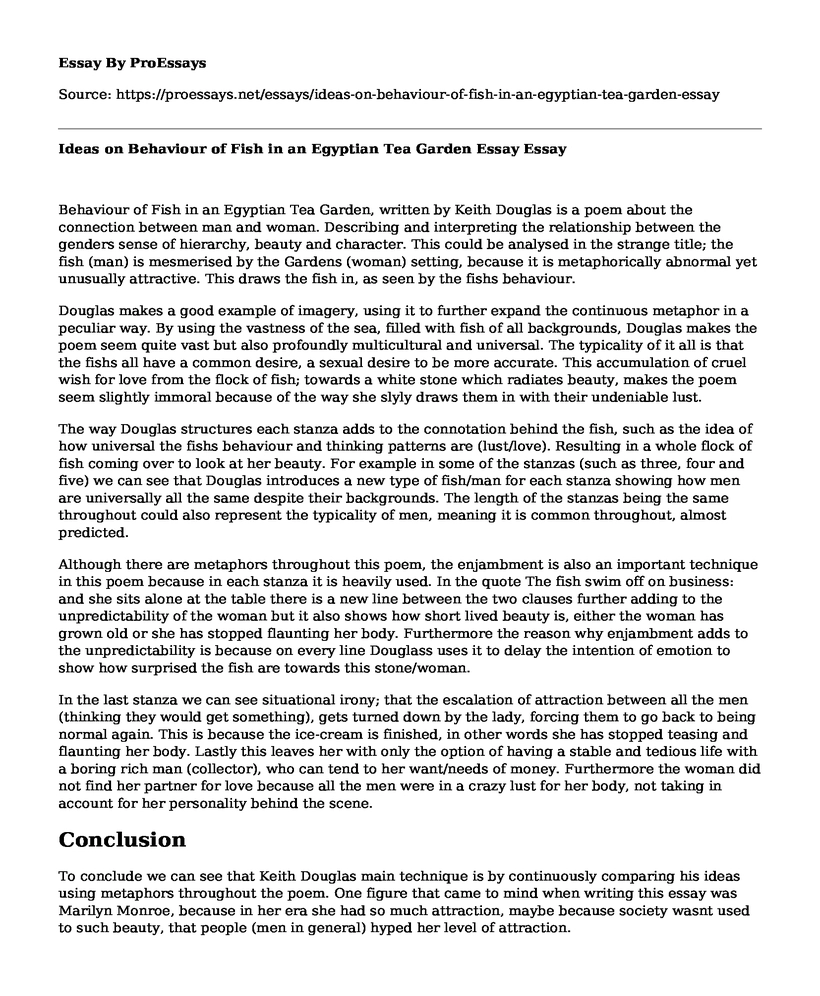Behaviour of Fish in an Egyptian Tea Garden, written by Keith Douglas is a poem about the connection between man and woman. Describing and interpreting the relationship between the genders sense of hierarchy, beauty and character. This could be analysed in the strange title; the fish (man) is mesmerised by the Gardens (woman) setting, because it is metaphorically abnormal yet unusually attractive. This draws the fish in, as seen by the fishs behaviour.
Douglas makes a good example of imagery, using it to further expand the continuous metaphor in a peculiar way. By using the vastness of the sea, filled with fish of all backgrounds, Douglas makes the poem seem quite vast but also profoundly multicultural and universal. The typicality of it all is that the fishs all have a common desire, a sexual desire to be more accurate. This accumulation of cruel wish for love from the flock of fish; towards a white stone which radiates beauty, makes the poem seem slightly immoral because of the way she slyly draws them in with their undeniable lust.
The way Douglas structures each stanza adds to the connotation behind the fish, such as the idea of how universal the fishs behaviour and thinking patterns are (lust/love). Resulting in a whole flock of fish coming over to look at her beauty. For example in some of the stanzas (such as three, four and five) we can see that Douglas introduces a new type of fish/man for each stanza showing how men are universally all the same despite their backgrounds. The length of the stanzas being the same throughout could also represent the typicality of men, meaning it is common throughout, almost predicted.
Although there are metaphors throughout this poem, the enjambment is also an important technique in this poem because in each stanza it is heavily used. In the quote The fish swim off on business: and she sits alone at the table there is a new line between the two clauses further adding to the unpredictability of the woman but it also shows how short lived beauty is, either the woman has grown old or she has stopped flaunting her body. Furthermore the reason why enjambment adds to the unpredictability is because on every line Douglass uses it to delay the intention of emotion to show how surprised the fish are towards this stone/woman.
In the last stanza we can see situational irony; that the escalation of attraction between all the men (thinking they would get something), gets turned down by the lady, forcing them to go back to being normal again. This is because the ice-cream is finished, in other words she has stopped teasing and flaunting her body. Lastly this leaves her with only the option of having a stable and tedious life with a boring rich man (collector), who can tend to her want/needs of money. Furthermore the woman did not find her partner for love because all the men were in a crazy lust for her body, not taking in account for her personality behind the scene.
Conclusion
To conclude we can see that Keith Douglas main technique is by continuously comparing his ideas using metaphors throughout the poem. One figure that came to mind when writing this essay was Marilyn Monroe, because in her era she had so much attraction, maybe because society wasnt used to such beauty, that people (men in general) hyped her level of attraction.
Cite this page
Ideas on Behaviour of Fish in an Egyptian Tea Garden Essay. (2022, Jul 28). Retrieved from https://proessays.net/essays/ideas-on-behaviour-of-fish-in-an-egyptian-tea-garden-essay
If you are the original author of this essay and no longer wish to have it published on the ProEssays website, please click below to request its removal:
- Essay Example on The Role of Bottom in Shakespeare's A Midsummer Night's Dream
- The Heart of Darkness Literary Analysis
- Compare and Contrast Paper on Mora's Poems: La Migra and Elena
- Literary Analysis Essay on Children of the Sea by Edwidge Danticat
- Comparative Analysis of Epic Poems: The Epic of Gilgamesh and Odyssey
- Medea's Otherness and Its Role in Shaping The Play Essay Example
- Essay Example on Shakespeare and Middleton's Timon of Athens: A Tale of Moral Conviction







